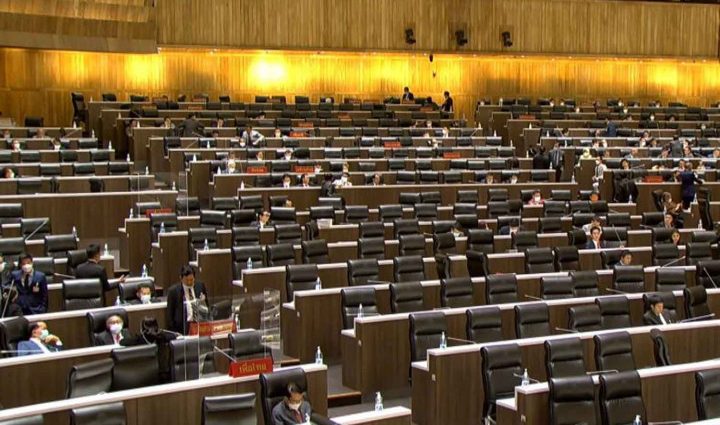
The Democrat Party said on Wednesday it will vote against its coalition partner’s cannabis bill because it ignores concerns about social problems.
The bill’s sponsor, the Bhumjaithai Party, said a negative vote would be unprecedented and damaging to the government coalition. It had a promise to keep and would not be deterred by the threat.
Democrat MP Satit Wongnongtaey said the party’s MPs would vote against the Cannabis and Hemp Bill because the House committee vetting it had ignored all the alterations proposed by Democrat and Pheu Thai MPs, and by the faculty of medicine of Chulakongkorn University.
Mr Satit, a Trang MP, was accompanied at a press conference at parliament by Rayong MP Banyat Jetanachan, Nakhon Si Thammarat MP Prakob Rattanaphan and party-list MPs Pisith Lee-artham and Pimrawee Panwichartkul.
The legislation was supposed to be deliberated in the second reading on Sept 14, but Democrat and opposition MPs from the Pheu Thai and Move Forward parties opposed its passage. They said it had been extensively altered during the scrutiny process after the first reading when it was introduced.
The House then voted 198-136, with 12 abstentions, for the bill to be withdrawn for further review by the scrutiny committee.
Mr Satit said the committee had finished its review, but not even one of the proposed alterations was made to the bill. The Democrat Party proposed 13 changes and the Pheu Thai Party five, while the faculty of medicine of Chulalongkorn University proposed that the bill be fully reviewed section-by-section, he said.
According to Mr Satit, after the bill was withdrawn from the House the scrutiny committee called only two or three meetings. Although some members tried to tell the committee to consider the proposed changes, they received no response, he said.
He said the Democrat Party’s proposals included that the committee reconsider whether cannabis was a narcotic drug, changing the definition of “medical use in households” and lifting the requirement for the Food and Drug Administration to promote the development of cannabis strains, which could contradict the agency’s responsibilities and create a conflict of interest.
Moreover, the bill still lacked controls on the trade in equipment for smoking cannabis.
“Use of cannabis is undesirable in Thai society. Cannabis should be reinstated as a Category 5 substance on the list of narcotic drugs,” Mr Satit said.
Mr Satit said the Bhumjaithai Party was wrong in saying that cannabis could not be reinstated on the narcotic drugs list, according to the Narcotics Act, because it had already been removed from the list.
In fact, Section 39 of the Narcotics Act stipulated only that the removal of cannabis from the narcotics list could be done with an announcement of the Ministry of Public Health, he said.
He called for Public Health Minister Anutin Charnvirakul, the Bhumjaithai party leader, to reinstate cannabis on the narcotics list. He insisted that the issue was not political, but of purely social concern.
Democrat list-MP Phisit said liberalisation of cannabis would lead to children being unwittingly addicted to it; Thailand would be branded the land of cannabis; goods exported from Thailand would be subject to thorough examination for fear they could have cannabis hidden in them; and Thai people travelling abroad would be thoroughly screened by immigration officers.
“Liberalisation of cannabis, therefore, should not be allowed,” he said.
Mr Anutin said the government whip had already resolved that coalition parties would vote for the bill, but “some coalition party still has an unclear standpoint”.
The bill was not drafted for the recreational use of cannabis and had clear penalties against its abuse, he said.
“Today the Bhumjaithai Party has kept the promise it made to the people. That was to remove cannabis from the narcotics list… The Bhumjaithai Party is not afraid of attempts to block it from becoming more popular. I’d say that’s too late,” Mr Anutin said.
If people approve, they should vote for Bhumjaithai candidates to sit in the House, he said.
Any coalition party that breached the government whip’s decision would be seen as taking an unprecedented step, and that would affect national administration and demonstrate the lack of spirit of a coalition party, Mr Anutin said.
The issue would affect decisions on the formation of a coalition after the coming general election, he said.
The House is expected to consider the Cannabis and Hemp Bill next week.

